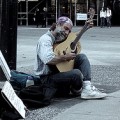Part 2
David: What do you listen to, specifically, and what do you like? You also like the hip-hop, and you also like the more heavier sounds as well.
Chris: Definitely, yeah, I guess I would like the heavier sounds. My life has gone through many phases. As I was telling David earlier, I am aware of "The Yellow Submarine," the Beatles song, and you said it was more or less a child's song, which is true. That's why I recalled it, because when I was a child I used to listen to it, that and Raffi and all the children's music. But I guess as I grew up, I went through a stage where I enjoyed more of a heavy metal, like AC/DC, or White Zombie, or Metallica. From there, I guess my sister influenced me a lot, because she was really into the hip-hop scene, and just listening to her music kind of, I guess, grew onto me. So now I listen to a lot of hip-hop or rap. But I still listen to all types of music. I enjoy hard house, which is a form of techno. I also like drum 'n bass, or breakbeats, because I find it very easy to dance to that type of music. You just let your body do its thing. With the Beatles, that's another aspect of it. I can't dance to a Beatles song the way I dance to a hip-hop song, and I believe I can get more girls the way I dance now than the way I would dance listening to the Beatles. David: Speaking of dancing and music, I love to dance but I can't dance at all. The sad thing that happened was-I think what happened was in the fifties and sixties, early sixties, kids would get together and dance. That's what they would do; they'd go to a sock hop or they'd go to a dance club, or whatever it was, and they would dance. And then what happened was the hippie movement came in, and everyone sat around doing drugs-or not necessarily doing drugs, but they had these long songs that you couldn't dance to. You sit around, you listen to them, and you go, "Wow, mellow." And you go, "What a great keyboard solo that went on for twenty-five minutes." Then what happened was disco came back, because people said, "You know what? It's fun getting stoned, I guess, once in a while, but I want to dance!" So you got disco, and then in the eighties you also had disco music. And then for a long time there wasn't anything to dance to, in the nineties and everything, until I started listening to bands like Orbital, and Chemical Brothers, and especially Underworld. Underworld-all of their stuff is just amazingly, incredible dance music, house music-there's other names for it, but there's a live CD by them called Everything, Everything, and it's a DVD as well. And you pop that on, man, and I just can't not dance. I am just jumping around like an idiot, I just love those sounds. It's an amazing sound. Okay, so what about instruments? You play the guitar, the piano, the accordion, the harpsichord, and I think something else-the tuba. Isn't that correct? Chris: You're leaving out the trumpet. I'm quite the orchestra when it comes to instrumental music. No, I don't play any instrument. I do enjoy instrumental music. I guess classical music would be one of the positives of instrumentals, but I think instrumental music is the foundation of music itself. I mean, words and meanings of the music also plays a large role, but without the instrument, there is no music.
David: So you never took piano lessons or anything like that when you were younger?
Chris: Well, I took piano lessons when I was very-living in Japan, but that didn't really get me anywhere. By the end of the lesson, I was probably hammering away at the piano with my fist. So I wouldn't call myself a Beethoven or a Mozart. David: Growing up in the eighties as I did, there was a lot of music that was more glamour, and musicianship came second. I found myself listening to older music, where they took the guitar and the bass and the drums seriously, and that's what really turned me on to playing guitar. And when I hear this heavier music that we both like, and even other bands like Chemical Brothers that do bring in guitar riffs, it really inspired me to learn guitar. And I can't-I still jump around playing air guitar when I'm listening to these songs, even though I can't play guitar. You listen to music that is so guitar-based; it has that crunching, thrashing guitar riffs. Especially AC/DC, which have written some of the most wonderful guitar riffs ever. If there's ever a better guitar composer for riffs other than Jimmy Page, it's going to be-no, no, no, not Brian Johnson-the little guy who wears the shorts, the little shorts . Angus . Young .

